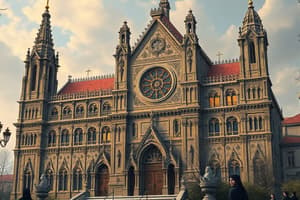Podcast
Questions and Answers
What were the goals of the Counter Reformation?
What were the goals of the Counter Reformation?
The goals were for the Catholic Church to make reforms which included clarifying its teachings, correcting abuses and trying to win people back to Catholicism.
Who were the Jesuits?
Who were the Jesuits?
They were an order of priests founded by Ignatius of Loyola, dedicated teachers and missionaries who supported the Pope.
What reforms were accomplished during the Council of Trent?
What reforms were accomplished during the Council of Trent?
They addressed abuses in the Church, called for the education of priests, improved discipline among clergy, stopped financial abuses, and abolished the sale of indulgences.
What reforms were not reformed during the Council of Trent?
What reforms were not reformed during the Council of Trent?
What was the Roman Inquisition?
What was the Roman Inquisition?
What was the Spanish Inquisition?
What was the Spanish Inquisition?
Explain the religious effects of the Reformation.
Explain the religious effects of the Reformation.
Explain the political effects of the Reformation.
Explain the political effects of the Reformation.
Flashcards are hidden until you start studying
Study Notes
Goals of the Counter Reformation
- Aimed to implement reforms in the Catholic Church.
- Focused on clarifying church teachings and correcting abuses.
- Sought to reclaim those who left for Protestantism.
Jesuits
- Founded by Ignatius of Loyola, known for education and missionary work.
- Established schools and colleges to enhance Catholic education.
- Played a vital role in spreading Catholicism across Africa, Asia, and the Americas.
- Became the largest religious order within the Church, supporting the Pope.
Reforms from the Council of Trent
- Addressed ecclesiastical abuses and corruption among clergy.
- Called for enhanced education and discipline of priests.
- Stopped financial abuses and abolished the sale of indulgences.
Issues not Addressed at the Council of Trent
- Rejected Protestant beliefs, including predestination.
- Emphasized the necessity of faith and good works for salvation, maintaining the concept of free will.
- Retained Latin as the language of the Bible, limiting accessibility.
- Affirmed the Pope as the Supreme authority in the Church.
Roman Inquisition
- Established in 1542 to prosecute heretical practices.
- Targeted Protestants, practitioners of witchcraft, and violations of Church law.
- Implemented severe punishments for those found guilty.
Spanish Inquisition
- Initiated by King Ferdinand and Queen Isabella to persecute non-Catholics, particularly Jews.
- Employed torture and execution for those resisting conversion to Catholicism.
- Featured an Index of Forbidden Books to enforce censorship.
- Utilized public trials known as Auto-da-fe, culminating often in harsh penalties.
Religious Effects of the Reformation
- Jesuits played a crucial role in disseminating the Catholic faith globally.
- Protestantism led to numerous splinter groups breaking away from the Catholic Church.
- Increased religious conflict characterized the period, with mutual persecution among Catholics and non-Catholics.
Political Effects of the Reformation
- Fostered the emergence of independent states and nations.
- Rulers and merchants sought to reduce the Church's influence in political and economic affairs.
- Political power transitioned away from religious institutions while some alignment between nations and churches persisted for regional influence.
Studying That Suits You
Use AI to generate personalized quizzes and flashcards to suit your learning preferences.




